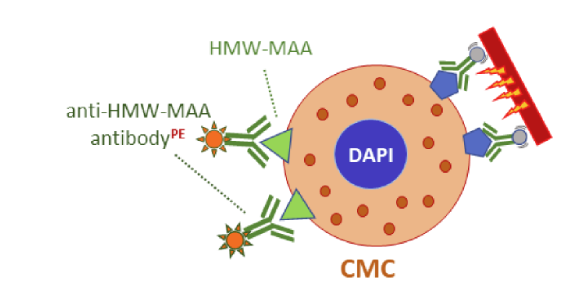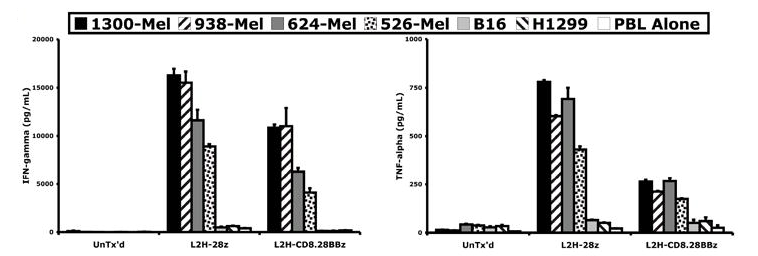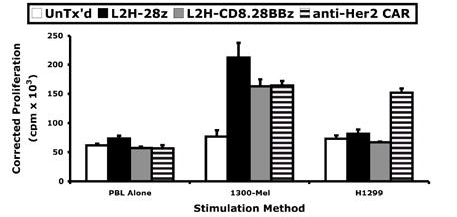All products and services are For Research Use Only and CANNOT be used in the treatment or diagnosis of disease.
Here we offer you a range of HMW-MAA CAR products. You can find the product you want by selecting the target species, antibody cloning, receptor construction, and more.
The tumor-associated antigen chondroitin sulfate proteoglycan 4 (CSPG4), also known as HMW-MAA, is a highly glycosylated transmembrane proteoglycan that is overexpressed in 67% GBM. Studies have shown that CSPG4 is overexpressed in a variety of solid tumors, including malignant melanoma, breast cancer subsets, mesothelioma, and neuroblastoma. In addition, CSPG4 expression was also found in some normal tissues. To date, CSPG4 is considered a promising target in targeted immunotherapy for cancer.
 Fig.1 HMW-MAA is expressed on circulating melanoma cells.1
Fig.1 HMW-MAA is expressed on circulating melanoma cells.1
Metastatic Melanoma
Mesothelioma
Creative Biolabs provides a series of CD123 CAR-T efficacy evaluation platforms in vitro, including but not limited to CD123 CAR expression testing, CD123 CAR-T cytokine release assays, in vitro toxicity testing, etc.
Anti-HMW-MAA CAR-T Expression Test
Creative Biolabs has successfully developed a series of fluorescently labeled CAR target-related protein products with our advanced site-directed labeling technology platform, which can meet the different needs of HMW-MAA CAR-T positive rate detection in an all-round way with its own product advantages.
 Fig.2 Optimized HMW-MAA-specific CAR expression levels in PBL.2
Fig.2 Optimized HMW-MAA-specific CAR expression levels in PBL.2
Anti-HMW-MAA CAR-T Cytokine Release Test
In CAR-T cell therapy, the levels of four key cytokines, IL-2, IFN-γ, IL-6, and IL-10, can be measured to determine whether Cytokine Release Syndrome (CRS) is induced and its severity. Creative Biolabs offers multiplex kits that can measure the levels of these four factors in HMW-MAA CAR-T cells, either separately or simultaneously.
 Fig.3 Cytokine release levels of optimized HMW-MAA-specific CAR.2
Fig.3 Cytokine release levels of optimized HMW-MAA-specific CAR.2
Anti-HMW-MAA CAR-T Cell Proliferation Test
In addition to cytokine secretion ability, the proliferation ability of HMW-MAA CAR-T cells is also a very important efficacy evaluation index for CAR-T cell therapy. Creative Biolabs has extensive experience in the efficacy evaluation of cell-based drugs to meet your diverse testing requirements.
 Fig.4 Proliferation test of optimized HMW-MAA-specific CARs.2
Fig.4 Proliferation test of optimized HMW-MAA-specific CARs.2
Cell line-derived xenograft (CDX) models or patient-derived xenograft (PDX) models are common models for in vivo studies of CAR-T. In addition, homograft models and animal models of human immune system reconstitution are also commonly found in published CAR T-cell therapy papers. After the animal is constructed, the CAR-T cells are re-infused, and then the downstream evaluation experiment is carried out. In vivo functional assessment of anti-HMW-MAA CAR-T cells include:
In addition to the above methods, Creative Biolabs also provides histopathological tests, including immunohistochemistry or H&E staining, to reflect the pathological changes of CAR-T cells, tumor cells or organ tissues from different dimensions.
References
 Loading...
Loading...
| CAT | Product Name | Target Species | Antibody Clone | Antibody Host | Receptor Construction | Vector Type | Targeting Cell Type | CAR Vector Type | Inquiry & Datasheet |
| CAR-T-1-M318-2 | Anti-HMW-MAA scFv h(CD28) CART, pCDCAR1 | Human | 225.28S | Mouse | scFv-CD28 | Lentiviral | T cell | ||
| CAR-T-1-M318-G | Anti-HMW-MAA scFv h(FcεRIγ) CART, pCDCAR1 | Human | 225.28S | Mouse | scFv-FcεRIγ | Lentiviral | T cell | ||
| CAR-T-1-M318-Z | Anti-HMW-MAA scFv h(CD3ζ) CART, pCDCAR1 | Human | 225.28S | Mouse | scFv-CD3ζ | Lentiviral | T cell | ||
| CAR-T-2-M318-2G | Anti-HMW-MAA scFv h(CD28-FcεRIγ) CART, pCDCAR1 | Human | 225.28S | Mouse | scFv-CD28-FcεRIγ | Lentiviral | T cell | ||
| CAR-T-2-M318-2Z | Anti-HMW-MAA scFv h(CD28-CD3ζ) CART, pCDCAR1 | Human | 225.28S | Mouse | scFv-CD28-CD3ζ | Lentiviral | T cell | ||
| CAR-T-2-M318-4G | Anti-HMW-MAA scFv h(CD4-FcεRIγ) CART, pCDCAR1 | Human | 225.28S | Mouse | scFv-CD4-FcεRIγ | Lentiviral | T cell | ||
| CAR-T-2-M318-4Z | Anti-HMW-MAA scFv h(CD4-CD3ζ) CART, pCDCAR1 | Human | 225.28S | Mouse | scFv-CD4-CD3ζ | Lentiviral | T cell | ||
| CAR-T-2-M318-8Z | Anti-HMW-MAA scFv h(CD8-CD3ζ) CART, pCDCAR1 | Human | 225.28S | Mouse | scFv-CD8-CD3ζ | Lentiviral | T cell | ||
| CAR-T-2-M318-BZ | Anti-HMW-MAA scFv h(41BB-CD3ζ) CART, pCDCAR1 | Human | 225.28S | Mouse | scFv-41BB-CD3ζ | Lentiviral | T cell | ||
| CAR-T-2-M318-CZ | Anti-HMW-MAA scFv h(b2c-CD3ζ) CART, pCDCAR1 | Human | 225.28S | Mouse | scFv-b2c-CD3ζ | Lentiviral | T cell | ||
| CAR-T-3-M318-2BZ | Anti-HMW-MAA scFv h(CD28-41BB-CD3ζ) CART, pCDCAR1 | Human | 225.28S | Mouse | scFv-CD28-41BB-CD3ζ | Lentiviral | T cell | ||
| CAR-T-3-M318-2XZ | Anti-HMW-MAA scFv h(CD28-OX40-CD3ζ) CART, pCDCAR1 | Human | 225.28S | Mouse | scFv-CD28-OX40-CD3ζ | Lentiviral | T cell | ||
| XS-0722-YT641 | Anti-HMW-MAA (HPAB-0070-LSX) h(CD28-CD3ζ) CAR, pCDCAR1 | Human | HPAB-0070-LSX | Mouse | scFv-CD28-CD3ζ | Lentiviral vector | T cell | ||
| XS-0722-YT642 | Anti-HMW-MAA (HPAB-0071-LSX) h(CD28-CD3ζ) CAR, pCDCAR1 | Human | HPAB-0071-LSX | Mouse | scFv-CD28-CD3ζ | Lentiviral vector | T cell | ||
| XS-0722-YT643 | Anti-HMW-MAA (TAB-102CT) h(CD28-CD3ζ) CAR, pCDCAR1 | Human | TAB-102CT | Human | scFv-CD28-CD3ζ | Lentiviral vector | T cell | ||
| XS-0722-YT644 | Anti-HMW-MAA (TAB-103CT) h(CD28-CD3ζ) CAR, pCDCAR1 | Human | TAB-103CT | Mouse | scFv-CD28-CD3ζ | Lentiviral vector | T cell | ||
| XS-0722-YT645 | Anti-HMW-MAA (TAB-104CT) h(CD28-CD3ζ) CAR, pCDCAR1 | Human | TAB-104CT | Mouse | scFv-CD28-CD3ζ | Lentiviral vector | T cell | ||
| XS-0722-YT646 | Anti-HMW-MAA (TAB-105CT) h(CD28-CD3ζ) CAR, pCDCAR1 | Human | TAB-105CT | Mouse | scFv-CD28-CD3ζ | Lentiviral vector | T cell | ||
| XS-0722-YT647 | Anti-HMW-MAA (T0Y580) h(CD28-CD3ζ) CAR, pCDCAR1 | Human | T0Y580 | Mouse | scFv-CD28-CD3ζ | Lentiviral vector | T cell | ||
| XS-0722-YT648 | Anti-HMW-MAA (T0Y581) h(CD28-CD3ζ) CAR, pCDCAR1 | Human | T0Y581 | Mouse | scFv-CD28-CD3ζ | Lentiviral vector | T cell |
 NEWSLETTER
NEWSLETTER
The latest newsletter to introduce the latest breaking information, our site updates, field and other scientific news, important events, and insights from industry leaders
LEARN MORE NEWSLETTER NEW SOLUTION
NEW SOLUTION
CellRapeutics™ In Vivo Cell Engineering: One-stop in vivo T/B/NK cell and macrophage engineering services covering vectors construction to function verification.
LEARN MORE SOLUTION NOVEL TECHNOLOGY
NOVEL TECHNOLOGY
Silence™ CAR-T Cell: A novel platform to enhance CAR-T cell immunotherapy by combining RNAi technology to suppress genes that may impede CAR functionality.
LEARN MORE NOVEL TECHNOLOGY NEW SOLUTION
NEW SOLUTION
Canine CAR-T Therapy Development: From early target discovery, CAR design and construction, cell culture, and transfection, to in vitro and in vivo function validation.
LEARN MORE SOLUTION